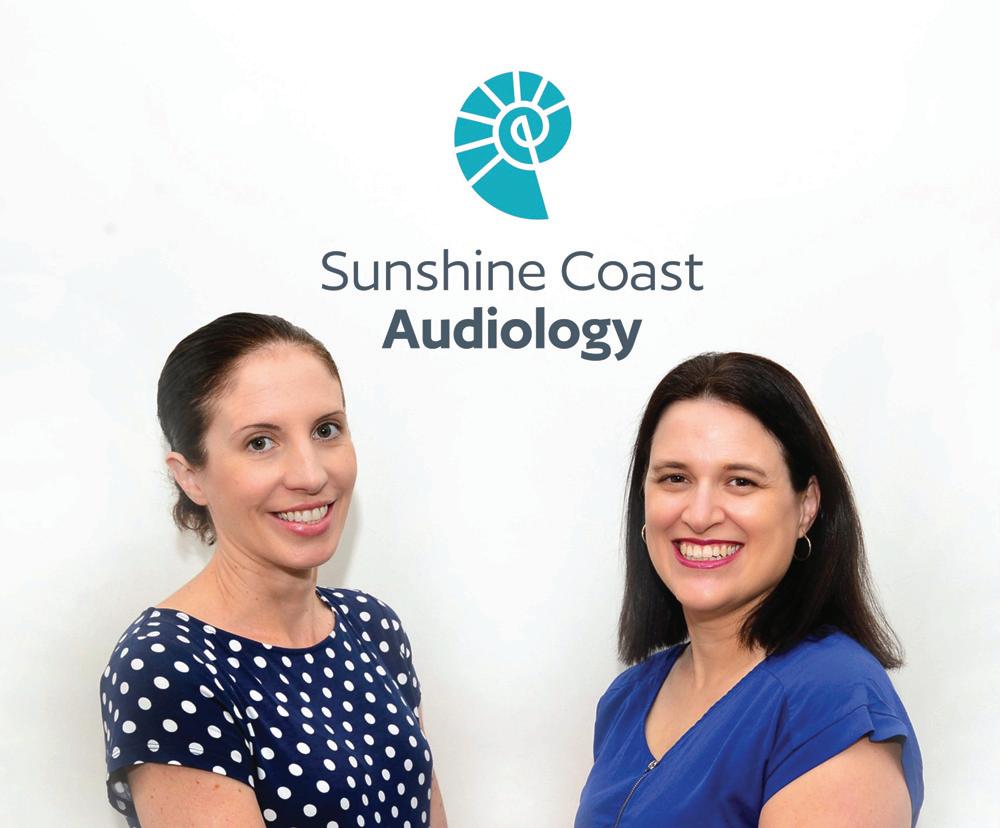
8 minute read
HEALTH
NOOSA SURGEON PIONEERS NEW EYE HEALTH TECHNOLOGY
Sunshine Coast Ophthalmologists at Noosa is one of the first practices in Australia to offer the Zeiss Quatera 700, new cuttingedge technology to improve vision for cataract patients.
Advertisement
Associate Professor Kristopher Rallah-Baker is one of three surgeons in Australia and the only surgeon in Queensland invited to pilot the new machine.
“SCO Noosa is the only permanent and fully equipped ophthalmic clinic in Noosa and combining this with state-of-the-art technology, we are really offering the highest quality of eye care to our community.”
About 50% of older Australians suffer from cataract and proceed to having cataract surgery. Cataract is the clouding of the natural lens within the eye, which leads to reduced vision. Cataract surgery is the most common eye operation performed in Australia and New Zealand and has a high rate of success already. New and emerging technologies aim to improve this even further.
The Zeiss Quatera machine represents a new experience in the one of the most important steps in modern cataract surgery – phacoemulsification. This is where the cataract is broken up using an ultrasonic device and removed from inside the eye.
The new technology improves efficiency and the safety profile of surgery, which results in less time in theatre for patients, a safer operation and potentially quicker recovery.
“This technology enables us to operate on the toughest cataracts and allows us to provide a more efficient procedure. This can result in quicker recovery for our patients”, Rallah-Baker said.
Are you interested in improving your eye health?
Contact your optometrist or GP for an assessment and referral. Associate Professor Kris Rallah-Baker and his team provide exceptional ophthalmic care to patients with modern rooms and state-ofthe-art equipment.
Ophthalmologists will soon be providing ophthalmic services to patients in Nambour. Phone Sunshine Coast Ophthalmologists at Noosa on (07) 5470 2400 or visit www. sconoosa.com.au for more information. Swelling in the feet is often caused by a build-up of fluid which is known as oedema. It can be caused by several things such as standing or sitting in the same position for too long, eating food with high salt content, being overweight, pregnancy or taking certain medicines. Swollen feet can also be caused by a strain such as plantar fasciitis, sprain or infection.
If the swelling doesn’t go away on its own, you should consult a doctor to determine the cause. In the meantime, there are some things you can do to try to help alleviate any pain such as wearing comfortable Cosyfeet slippers or seam-free and wide-fitting Cosyfeet comfortable shoes.
Make sure you seek advice from your doctor if the swelling is only in one ankle, foot or leg and there’s no obvious cause, such as an injury.
There are also some simple ways to help with swollen feet and fluid retention such as lying down and using pillows to raise your feet when you can. You could also consider incorporating some gentle exercise into your daily routine, such as walking, to improve your blood flow.
Wearing Cosyfeet high quality extra wide fitting footwear with a low heel, comfortable sole and a wide toe box can help with any discomfort associated with swollen feet. It is also important to wash, dry and moisturise your feet to avoid infections. We also suggest that you avoid standing or sitting for long periods of time or wearing clothes or socks that are too tight.
Other symptoms to be aware of include severe swelling which is painful or starts suddenly, if the swollen area is red or feels hot to the touch, if your temperature is very high, or if you feel hot and shivery. If you encounter any of these issues you should seek medical advice.
Wearing correctly fitting shoes if you have wide feet can help provide additional support. You could also consider buying extension straps to help accommodate extremely swollen feet and ankles. Our specially designed Cosyfeet shoes for swollen feet and accessories can also be ideal for those with bandaged feet. For more info: Phone Monday to Friday on 1300 767 888 or go to cosyfeetaustralia.com.au

Welcome to Sunshine Coast Audiology

Our services include:
• We are an accredited provider of the Hearing Services Program • Hearing rehabilitation for adults • Hearing aid repairs and adjustment • Full diagnostic hearing assessments for school-aged children and adults • Hearing screenings for adults and school-aged children • Supply and fitting of custom and over-the-counter ear plugs • Tinnitus management
Why Choose us?
We are an independent practice with no affiliation to hearing aid manufacturers, as such we are able to recommend, fit and adjust hearing devices from all leading brands and will do what is right for you as the patient, not a foreign shareholder. We look forward to meeting you and your loved ones and assisting with your hearing needs. If you have any questions, don’t hesitate to contact us! - Anita Burgess and Emryn Maclachlan
IRRITABLE bowel syndrome (IBS) can be challenging to manage as triggers and symptoms differ between patients, and can even vary from time to time for the same individual. However, there are some simple strategies people can try to help manage their condition, says an expert from global health system Cleveland Clinic during IBS Awareness Month.
“IBS is difficult to manage as individuals may find that a certain food type that causes no issues on one day, can trigger abdominal pain or discomfort on the next. Additionally, stress, anxiety, travel, new medications, and negative emotions can make IBS symptoms worse. Thankfully, in many cases, modifying dietary habits, making time to exercise, staying physically active, and stress management can significantly reduce the severity and frequency of common IBS symptoms such as bloating, cramping, gas, and diarrhea,” says Cleveland Clinic gastroenterologist Christine Lee, MD.
IBS is the most common functional gastrointestinal (GI) disorder and a recent meta-analysis estimated IBS prevalence at around 11.2% of the global population. The International Foundation for Functional Gastrointestinal Disorders organizes IBS Awareness Month in April, while the IBS Patient Support Group in 2019 declared April 19 as the annual World IBS Awareness Day.
There is no cure for IBS, so experts focus on helping their patients to manage the symptoms, which requires patience and discipline, says Dr. Lee. She advises her patients to keep track of their triggers and record their symptoms. “Eventually we can start to piece together what makes a difference in their IBS management,” she says.
Dr Lee adds that there is no ‘one size fits all approach’ to managing IBS, but that there are strategies that patients can try themselves to see which ones work for them. “With a little time and patience, you can start to identify which strategies help your symptoms and what you can realistically incorporate into your life. If you’re really stumped, a medical provider can provide more direction and tips for fostering a healthy gut,” she says. Dr. Lee’s strategies to help manage IBS 1. Pump up your protein: Try to eat protein at every meal to help prevent blood sugar imbalances that feed bad gut bacteria. Choose sustainably raised fish, turkey, chicken, nuts, beans, seeds and tofu. 2. Feast on fiber-rich foods: Enjoy high-fiber whole grains, veggies, nuts, seeds and fruit. The fiber in these foods will keep a person fuller longer, and fiber is also good for the gut. 3. Don’t be afraid of fat: Choose healthy omega-3 fats, like wild salmon, sardines, flaxseed and seaweed. Individuals can also try to include grass-fed, organic animal products and healthy oils such as olive, sesame seed and nut oils. Avoid all hydrogenated fat, like margarine, processed foods, oils and baked goods when possible. 4. Include fruits and veggies: Aim for 8 to 10 servings of colorful fruits and vegetables a day — the vitamins, minerals, fiber, nutrients and antioxidants can help fight off many diseases. 5. Pass on the processed food: Do not let junk food, sodas, sugary juices and diet drinks impact on sugar and lipid metabolism. Liquid sugar calories contribute to obesity, diabetes and even heart disease. 6. Relax regularly: Try to practice meditation, deep breathing or yoga every day. Lowering stress levels can ease and prevent IBS symptoms from flaring up, along with many other health conditions that come when the body is in a constant state of stress.

Will your feet carry you safely?
We can help with Diabetic Footcare Foot orthotics, Ingrown toenails ,Heel pain & General foot care
YES we accept Veterans Affairs and Medicare referrals from your Doctor.
Suite 3 Buderim Medical & Dental Centre Cnr King 5445 1376 & Box Streets, Buderim Book Online - www.buderimpodiatry.com.au Ask us about home and hospital visits
Buderim Podiatry_8th_YT_OCT 2020_SC.indd 1 2/06/2021 12:50:37 PM












